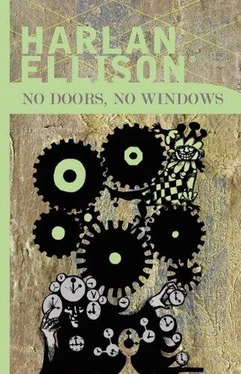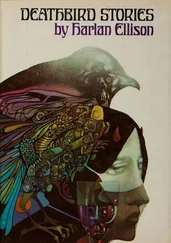“You’re like all the rest of them,” she said, with the nastiest tone Harry could remember having heard in years.
“How’s that, Angie? Like all the rest of the knights on white chargers who’ve saved you from Daddy and the Klan? Get off it. What the hell’s that supposed to mean: you’re like all the rest? ”
“You took what you could get back there in that barn.”
“I took what was offered. And why not? Does fucking you mean I inherit you? This isn’t the Orient, we’re not locked together forever by a bond of debt. Don’t be cute, kiddo: it didn’t mean any more to you than it did to me. You’re a big girl, and I’m a converted chauvinist pig, and this is the middle of the Seventies and we don’t owe each other anything.”
Then she tried to be sweet. “But, Harry … I want to go with you. You got me out of there, you saved my skin …”
“Call it even for the wonderful sex. But that’s it. When we get to Raleigh you go your way, and I go mine.”
“You’re too wild for that. Harry. You like the excitement.”
Harry hit the brakes. Air blew out, the rig fought the road, slowed, and Harry tooled it onto the shoulder. He let it idle in neutral as he turned to her.
“Okay, now here is what it’s really all about. Not the bullshit that’s swamping your brain, but what it’s really all about.
“My name is Harry Fischer. That’s Fischer with a ‘c’ in it; I figured I’d tell you that because you were too busy getting it on in that haystack to really catch the name; I mean, you were already trying to maneuver me into fucking you before you gave a shit who I was, except that I was a guy who could get you out of town. So the sex is about as big a debt as a hot roast beef sandwich with mashed potatoes and salad on the side.
“So pay attention: it’s Harry Fischer, and I’m forty years old, and I’ve got a terrific wife and three kids and I like them and they like me and the only reason I’m on this fucking suicide run lugging nitro is because it pays high-hazard and nobody else wanted the goddam job and I took it because the biopsy report came back three months ago and it says with treatment I’ve got maybe another year. Now can you piece all that together and understand that I’m not the fucking Lone Ranger, that I jumped in to ‘save’ your ass because of, hell, I’m not even sure, something I remembered from when I was a kid, and any body can be a hero once, but I’m not John Wayne or Clint Eastwood or any damn body else, I’m just a forty-year-old truck driver who’s dying of cancer and I didn’t have as much to lose as some guys so I did it! But that don’t make me Sir Lancelot, and it sure don’t make me a gay, mad adventurer ready to go streaking off across the countryside with a lady who shoots her old man as many times as she can before I grabbed the gun. Does all of that penetrate, kiddo?”
She sat staring at him for a long time.
And after that long time she said, simply, “You prick.”
Harry nodded with resignation. “Right. I’m a prick. A tired old prick, little miss. And there’s an awful lot of your Daddy in you. But at least now we’ve been properly introduced.”
And he put it in gear, moved it off the shoulder, got it up to cruising speed, and went to Raleigh.
And after he let her out on a street corner in downtown Raleigh, and after she gave him the finger as the rig moved away from the curb, Harry Fischer with a c returned the truck to the company that had bonded him, picked up his paycheck, and went home to his wife and kids.
(AN HOMMAGE TO CORNELL WOOLRICH)
The hell of it is, you’re never as tough as you think you are. There’s always somebody with sad eyes who’ll shoot you down when you’re not even looking, when you’re combing your hair, tying your shoelace. Down you go, like a wounded rhino, nowhere near as tough as you thought.
I came in from the Coast on a Wednesday, got myself locked up in the Warwick to finish the book, did it, called the messenger and had him take the manuscript over to Wyeth the following Tuesday, and I was free. Only nine months late, but it was an okay piece of work. It was going to be at least three days till I got the call telling me what alterations he wanted — there were three chapters dead in the middle I knew he’d balk at — I’d cheated on the psychiatric rationale for the brother-in-law’s actions, had held back some stuff I knew Wyeth would demand I flesh out — and so I had time to kill.
I’ve got to remember to remind myself: if I ever use that phrase again, may my carbons always be reversed. Time to kill. Yeah, just the phrase.
I called Bob Catlett, thinking we’d get together for dinner with his wife, the psychiatrist, if he was still seeing her. He said we could set it up for that night and by the way, why didn’t I come along for the monthly meeting of The Cerberus Club. I choked back a string of uglies. “I don’t think so, man. They give me a pain in the ass.”
The Cerberus is a “writers’ club” of old pros who’ve been around since Clarence Buddington Kelland was breaking in at Munsey’s Cavalier . And what had been a fairly active group of working professionals in the Fifties and Sixties was now a gaggle of burnt-out cases and gossips, drinking too much and lamenting the passing of Ben Hibbs at the Saturday Evening Post . I was thirty years past that time, a young punk by their lights, and I saw no merit whatsoever in spending an evening up to my hips in dull chatter and weariness, gagging on cigarette smoke and listening to septuageneric penny-a-word losers comparing the merits of Black Mask to those of Weird Tales .
So he talked me into it. That’s what friends are for.
We had dinner at an Argentinian restaurant off Times Square; and with my belly full of skirt steak and bread pudding I felt up to it. We arrived at the traditional meeting-place — the claustrophobic apartment of a sometime-editor who had once been a reader for Book-of-the-Month Club — around nine-thirty. It was packed from wall to wall.
I hadn’t seen most of them in ten years, since I’d gone to the Coast to adapt my novel, THE STALKING MAN, for Paramount. It had been a good ten years for me. I’d left New York with a molehill of unpaid bills the creditors were rapidly turning into a mountain, and such despair both personally and professionally I’d half accepted the idea I’d never really make a decent living at writing. But doing four months’ work each year in films and television had provided the cushion so I could spend eight months of the year working on books. I was free of debt, twenty pounds heavier, secure for the first time in my life, and reasonably happy. But walking into that apartment was like walking back into a corporeal memory of the dismal past. Nothing had changed. They were all there, and all the same.
My first impression was of lines of weariness.
Someone had superimposed a blueprint on the room and its occupants. In the background were all the moving figures, older and more threadbare than the last time I’d seen them gathered together in a room like this, moving (it seemed, oddly) a good deal more slowly than they should have been. As if they were imbedded in amber. Not slow motion, merely an altered index of the light-admitting properties of the lenses of my eyes. Out of synch with their voices. But in the foreground, much sharper and brighter than the colors of the people or the room, was an overlay of lines of weariness. Gray and blue lines that were not merely topographically superimposed over faces and hands, and the elbows of the women, but over the entire room: lines rising off toward the ceiling, laid against the lamps and chairs, dividing the carpet into sections.
Читать дальше












